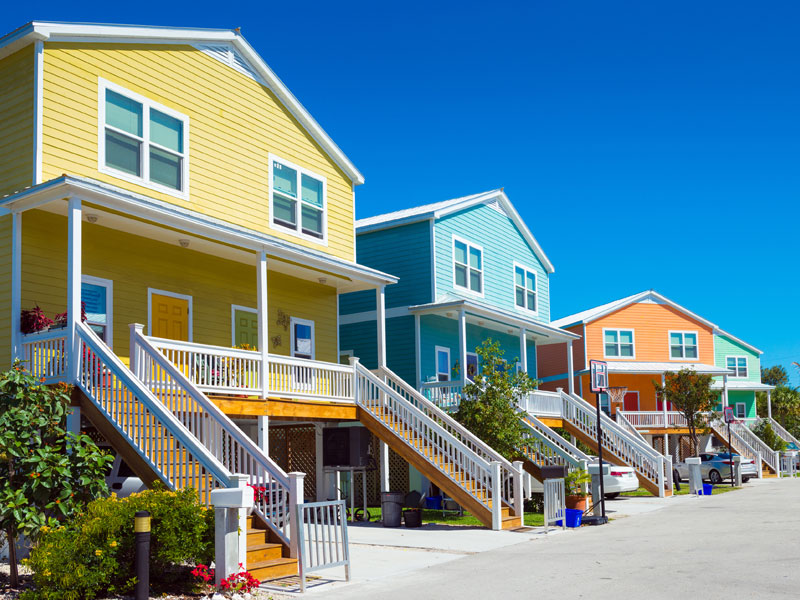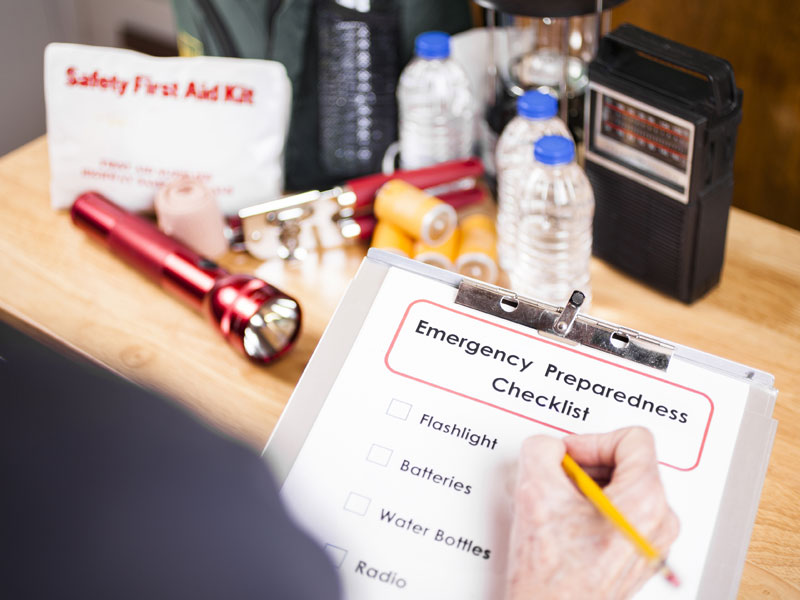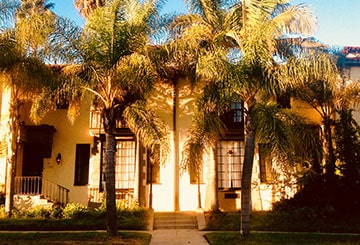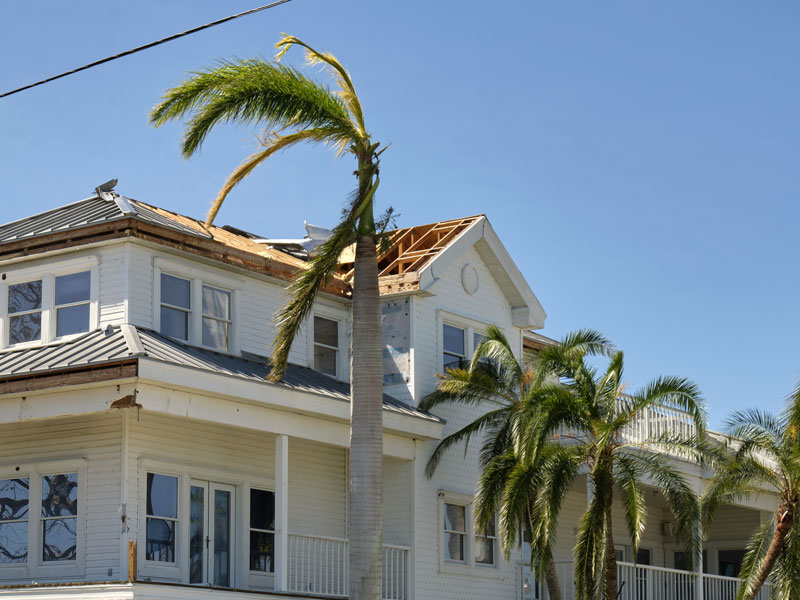The Florida Keys— and the entire Sunshine State— are well-known for being the ultimate destination if you’re looking to enjoy clear blue skies and plenty of sun. These are the hallmarks of a subtropical climate. That said, it can get wet here, too. Especially during hurricane season.
Table of Contents:
Why does Florida get a lot of hurricanes?
Florida’s unique geography and location makes the state particularly prone to hurricanes. The long coastline, combined with the subtropical climate, makes for a breeding ground for storms and hurricanes. And if they’re not forming in the Atlantic, hurricanes are also most likely to pass through Florida as they move north or northwest. To date, about 41% of the hurricanes recorded in the United States made landfall in Florida.
When is hurricane season?
The Atlantic hurricane season typically runs from June through October. That doesn’t mean, however, that there will be constant hurricanes throughout those months. That will depend on weather patterns and other factors. Historically speaking, hurricane formation takes place from August through October.
Even during the established hurricane season, there is no way to accurately predict the formation of a hurricane. Some tropical storms don’t get large or strong enough, while some hurricanes spend so much time in the open sea that they dissolve without ever making landfall. The best way to know if your area will be affected is to keep apprised of the situation.
How often do hurricanes occur in the Florida Keys?
Most hurricanes pass through the Florida Panhandle and southeast coast. That said, the Florida Keys gets its fair share of storms.
One of the strongest hurricanes to hit the Florida Keys was Hurricane Ian in September 2022. Winds reached up to a speed of over 150 mph, battering the region. Storm surge also caused flooding and significant damage. But while Key West bore the brunt of the impact, the city was also quick to recover. It only took about two weeks to finish cleanup, and sooner rather than later, Key West was welcoming visitors again.
Click here if you’d like to learn more about the Florida Keys’ hurricane risk.
Five ways to hurricane-proof your home in Florida

Due to potential tidal or storm surges, most of the new construction in the Florida Keys are elevated. They are either on stilts, on pilings, or raised by using Topsider’s unique pedestal house foundation. Houses in the Florida Keys must be designed to withstand hurricane-force winds of 180 mph. The requirements for high-performance windows, as well as high-impact glass, are meant to protect against wind and debris carried by the strong wind.
If you already own a home in the Florida Keys, here are some worthwhile home improvements to protect it from the tropical storm.
- Strengthen your roof
The roof protects your home, family, and belongings against rain, snow, sunlight, wind, and extreme temperatures. It also provides structural support, keeping the entire house together. After constant exposure to strong winds, rain, and other outside forces, a house’s roof can become compromised. And if it collapses, your house will sustain further damage.
Roofing is typically heavy duty and durable, but in the Florida Keys, go one step further and invest in a hurricane-resistant roof. Metal can withstand wind gusts of up to 140 mph. Metal roofs can be made from steel, tin, copper, aluminum, or zinc, and they last 50 years longer than asphalt shingles.
It is important to note, however, that metal roofing is more expensive than standard roofing. According to experts, you should budget $1,000 extra in low-wind areas and up to $5,000 extra in high-wind areas. Another thing to remember is to double-check local and state building codes before having it installed on your house.
- Install impact windows
One of the most effective ways to protect your home from hurricanes is by installing impact windows. In fact, if you Google “how to hurricane-proof your home,” you will most likely come across this suggestion.
Impact windows are made with impact-resistant glass that is securely installed into the frame. Storm-force winds, hail, and heavy rain won’t break your windows with this durable glass. Florida homeowners are practically required to install this type of glass.
Broken windows allow wind to enter the house, increase pressure, and seek another exit. This can result in serious damage to a home during a hurricane. Thanks to impact windows, such an incident is less likely to happen. Additionally, since impact windows are so difficult to break, potential burglars will be deterred from entering.
- Switch to fiberglass doors
In addition to windows, make sure that all of your exterior doors are impact- and wind-resistant. Debris is unavoidably thrown into the air during a hurricane. And with hurricane-force winds, only one of these windblown items is enough to knock down the average front door. Once the door is knocked open, more debris, wind, and water can enter. The increased pressure can cause structural damage, and excess water can flood the house.
Consider installing hurricane-proof doors on the outside of your house to prevent these disasters. These are typically made of fiberglass, which is stronger than standard doors and can be designed to look like wood. Unlike wooden doors, fiberglass doors do not scratch, peel, or warp. They can also withstand different weather conditions.
Fiberglass doors typically cost between $1,500 and $2,000, depending on customization. Additional upgrades you may want to consider thicker frames and storm-resistant panels to secure your patio, porch, or lanai. Storm screens can also keep natural forces at bay.
- Invest in a heavy-duty garage door
Garage doors are the largest entry point into your home, making them especially vulnerable during a hurricane. If your garage door breaks, you may lose your car and other belongings to flooding. Steel is a good material to consider for an upgrade. You can add reinforcement posts and springs are usually added to provide extra strength and durability.
Steel posts can be installed DIY, but it’s better to have a professional do it for you. The average cost of an impact-resistant garage door ranges from $750 to $1,295. Check the manufacturer’s wind resistance specifications to ensure they meet local code requirements.
If you’re on a tight budget, experts recommend installing removable galvanized steel and aluminum panels on a garage door during a storm. Alternatively, you can install vertical storm braces on non-wind load doors.
- Keep your lawn and landscaping in good shape
A well-maintained yard can also protect your home from hurricane damage.
Clean gutters ensure the smooth flow of stormwater runoff, making hurricanes and tropical storms less likely to cause damage to your home. Trimmed trees and bushes lessen the likelihood of loose branches being thrown around during a hurricane.
Examine tree trunks for cracks or if the tree is leaning to one side. An unstable root system may cause trees to topple during a storm. If you see a tree that appears to be on its way down, call a professional to have it removed. The best approach, however, is to have any questionable trees examined by an arborist.
During a hurricane, any landscaping decorations that could become projectiles should be removed from your yard. A few of these items are potted plants, rocks, gnomes, gravel, solar lamps, and lawn furniture.
- Do these easy, last-minute hurricane preparation projects
In an emergency, it’s best to plan ahead. But what if a hurricane is headed your way and you only have a few hours or minutes to get ready? Here are a few last-minute precautions you can take.
- Keep all interior doors closed, including your garage door. A closed interior door can reduce roof pressure by up to 30%, giving the roof more chances of surviving a storm.
- Stay up-to-date with weather alerts and information. Keeping informed is essential if you want to stay safe. Real-time hurricane forecasts are available from the National Hurricane Center. Keep a battery-powered radio nearby for local updates, and ensure that your phone is set to receive wireless emergency notifications.
- Lock up loose items outside. Hurricane winds can blow away planters, bicycles, patio furniture, and other outdoor décor, causing structural damage. Make sure any deck boards, loose fencing, or mailboxes are secured as well.
- Make a home inventory list before a hurricane hits so you’ll know what’s missing or damaged in case an insurance claim is needed. You can read more about this below.
Additional tip: Ensure that water drains away from your house. Invest in a sump pump and drainage system for your basement and crawlspace to keep them dry.
How to prepare for a hurricane

Hurricanes are a fact of life in the Florida Keys. This basic hurricane preparedness checklist will help ensure your safety in case a hurricane is projected to hit your town or city.
- Make a plan for evacuation and communicate it with your family.
- Stock up on essential supplies such as non-perishable food, bottled water, batteries, and flashlights. You should also keep a battery-operated radio on hand for updates on the storm and its aftermath.
- Keep a first-aid kit on hand and fill prescriptions in advance. Purchase supplies such as toilet paper, disposable diapers, and hand sanitizer.
- Cash is often the only means of payment after a natural disaster. Some establishments might not give change, so it’s a good idea to have some smaller bills and coins available.
- Prepare important documents, such as insurance policies and identification, in a waterproof bag or container. Put this in an emergency bag, which should also be packed with extra clothes, medicine, and other essentials.
- Charge all electronic devices, and have extra charging devices available.
- Fill up your vehicle’s gas tank and keep it in a safe place.
- Check on neighbors who may need assistance, especially the elderly or those with disabilities.
- Make arrangements for pets, as many evacuation shelters do not allow animals. In a worst case scenario where you can’t take your pets with you, don’t tie them or lock them up to increase their chances of survival.
- Stay informed and follow the instructions of local authorities.
What to do after a hurricane
In the aftermath of a hurricane, you may find yourself swamped with things to do. Before you get preoccupied with other tasks, here are several things you should do.
- Document everything
It will be much easier to file an insurance claim if you take detailed pictures of the damage. It is also important to keep a clear breakdown and detailed description of every possession, including food items, that has been damaged or destroyed. Keep all receipts so that you can submit them as part of your deductible claim.
- Check your insurance policy
Some insurance companies operate on a first-come, first-served basis. In order to protect your interests, you should file an insurance claim as soon as possible. Provide specific, unbiased information about the damage to the insurance company, and inform them that you have an inventory of your belongings. An insurance adjuster will inspect your property and calculate your payout.
- Make emergency repairs
Cover broken windows with plastic or place tarps over roofs to keep the rain out and prevent further damage. It’s a good idea to wait until after the damage has been assessed by an insurance adjuster before commissioning permanent repairs. Don’t dispose of damaged items after the storm. Getting the best settlement offer for your claim requires seeing the event firsthand.
- Find a safe place to stay.
If your home is uninhabitable, arrange for temporary housing for you and your family or ask your agent to do so while your home is being repaired. Typically, a standard homeowner’s insurance policy will cover your family’s lodging if the damage is covered. Be sure that you have this coverage and that your policy specifies the monetary value and period of coverage. You can also ask your real estate agent for more information.
The Hinds Group is your Florida Keys real estate partner
When it comes to buying real estate in the Florida Keys, we get real with our clients. Apart from helping you find homes based on your lifestyle preferences and budget, our team wants to make sure your dream home is future- and hurricane-proof.
With 46 combined years of real estate experience, we’ve helped plenty of homebuyers and sellers fulfill their goals in the Florida Keys. Whether you’re interested in living in Florida Keys communities or eager to explore what South Florida’s housing market has to offer, we have your back.
Our team looks forward to being part of your Florida Keys real estate journey. Get in touch with us at 954.553.0448 or send an email.





